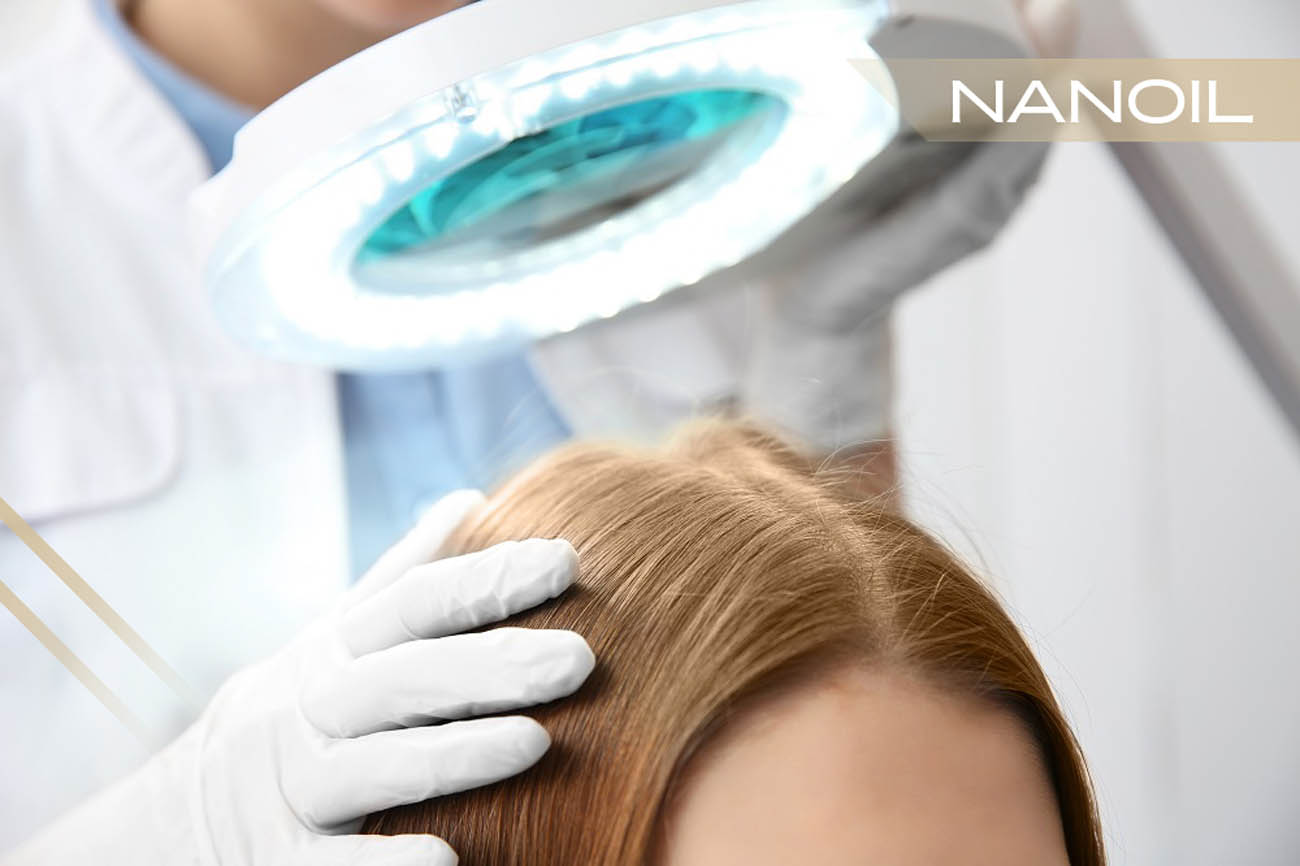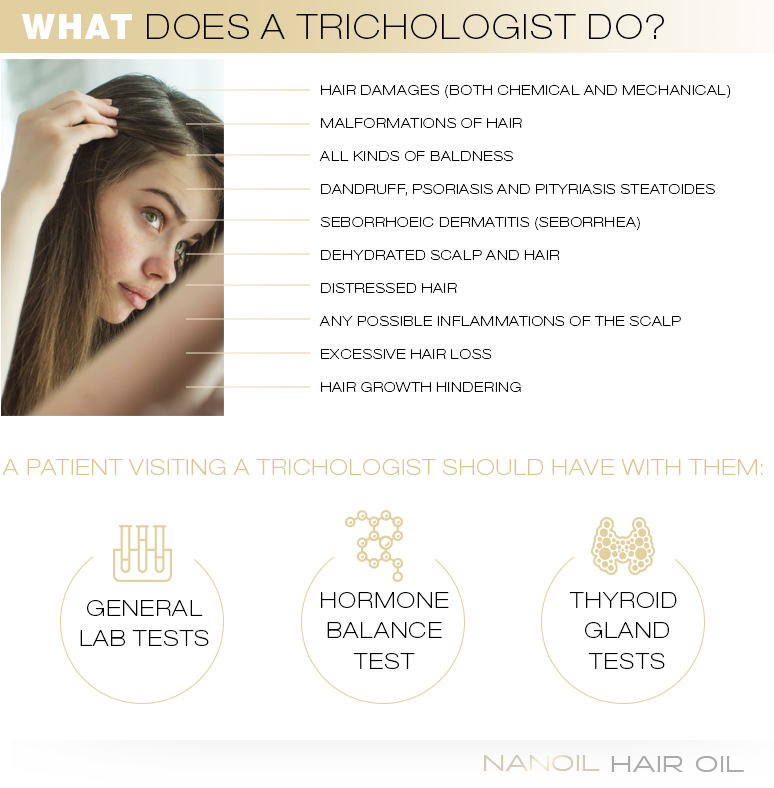- NANOIL Products
- Oils
- Face serums
- Hair masks
- Shampoos
- Hair conditioners
- Hair styling
- Care
- Hair Porosity Test
- Blog
- Contact

Hair and scalp problems aren't rare. It happens that no preparation available at a pharmacy’s or a drugstore's is able to deal with an issue - in this case, the best solution is to stop trying to cure the ailment on your own because all you might end up with is worsen the situation even more.
Scalp ailments are studied by trichology, which is a branch of dermatology (Greek trichos stands for hair). Its seminal figure was Enzo Formentini - a professor and a lecturer in the University of Bologna. It can be said that trichology is a kind of cosmetic-and-medical innovative which fills in the gap between the help provided by dermatology field of study and hair beautifying treatments. It is used to identify early signs of ailments in a patient and helps to tackle various scalp and hair problems.

Innovation of trichology depends on combining the most recent achievements with the knowledge of a few fields of study: cosmetology, cosmetics, hairdressing, dermatology, cosmetic physiotherapy, aesthetic medicine, and even psychology and food science.
A precise analysis concerning the scalp and hair bulbs is performed by a trichologist. This specialist can be colloquially named a hair doctor. The main task of a trichologist is to conduct medical reconnaissance regarding a patient's hair, her/his lifestyle, applied cosmetics and medications in order to proceed with a thorough examination of the patient's scalp and hair afterwards. Moreover, a trichologist selects appropriate products which target a particular hair problem as well as, if it appears to be necessary, suggests special treatments to be undergone at the doctor’s office.
The first appointment arranged with a trichologist may last a little bit longer than the others - the specialist conducts, so-called, a trichologist diagnosis, which is a kind of a 'background survey' of hair. Then, a trichologist fills a special, formulated in an institute form and creates a patient chart (a medical chart). Thanks to this document, it can be possible to monitor the progress of a treatment as it enables fast reaction during the entire process of hair healing-and-conditioning procedure.
In order to make the examination reliable, you must be well-prepared for the first visit you are going to pay. This means that you shouldn't wash the hair at least a day before the arranged visit so as to help the specialist assess how your sebaceous glands work and what the degree of epidermis keratinization is. Moreover, you should refrain from applying any hair styling cosmetics (hair sprays, mousses, gels, etc.). Last but not least, you shouldn't dye your hair before visiting a trichologist. However, if you really feel like dyeing your strands, you can do it but no later than a few weeks before the scheduled appointment.
Surely, a trichologist will ask you what the reason of your visit is so, in other words, what makes you worry. Also, the specialist will ask you to summarise the disturbing signs you have noticed. The other queries might consider:
It's better to visit a trichologist being equipped with a set of lab test results which don't only help the specialist to establish accurate diagnosis but also significantly accelerate the healing process. It’s highly probable that at the first visit a trichologist will ask you to run a set of lab tests to look at them at the next visit. Nevertheless, it's advised to do them beforehand so it is possible for a specialist to provide the patient with the right diagnosis and start the treatment sooner.
As long as it's worth doing the general lab tests beforehand, you may be asked to run the hormone (including thyroid) tests during the course of the treatment.
The basic and the most crucial trichology examination is trichoscopy, which is an imaging examination that requires use of a 200-x magnification microscope. Thanks to this device, a trichologist is able to asses condition of the scalp and its type along with the state of hair follicles and surrounding blood vessels. Owning to this information, a specialist can establish an individual diagnosis as well as select types of treatments as well as pharmaceuticals which will help cope with a particular ailment.
A more detailed examination a trichologist may administer, and if there is the need for this, is use of a special device (a kind of digital hair analyser) synchronised with a dedicated computer program. It enables to conduct a highly detailed analysis concerning scalp and hair condition - including its outer layers (hair porosity level) as well as its inner structures. Owning to this very device, it's also possible to carry out in-depth analysis of hair bulbs, assessing their thickness and condition. Also, this device can count hair and define the stage a particular hair currently is at. Moreover, the digital analyser gives the percentage of hair being at its growth stage and compare it with the percentage of hair that is at the resting phase and is dying out.
A trichologist deals with highly serious problems affecting the scalp and hair, therefore, once you realize that you aren't able to cope with some hair ailment, a trichologist office visit might appear to be inevitable. It' s also worth realizing that whether a trichologist will be able to help us depends on how much detailed answers we give him at the first appointment.
Many ailments connected with scalp and hair state can be cured at home thanks to selecting appropriate, delicate and natural products to treat hair with. Frequently, hair oiling turns to be immensely helpful. Still, it's a good idea to see a trichologist to get hair porosity level and scalp condition defined professionally. Thanks to this, we can intensify the action delivered by natural oils and hair washes.
Comments: #0